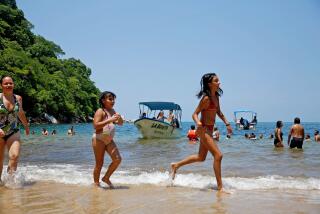Big India Earthquake Won’t Affect Trekkers
- Share via
World Travel Watch is a monthly report designed to help you make informed judgments about travel. Because conditions can change overnight, always make your own inquiries before you leave home. In the United States, contact your passport agency office; abroad, check in with the nearest American embassy. Asia
India: The Oct. 20 earthquake that struck a remote and rugged corner of the Uttar Pradesh, destroying thousands of homes and killing at least 375 people (with some estimates running as high as 670), will not affect travelers in the popular trekking regions of northern India and Nepal. The quake, which measured 7.1 on the Richter scale, struck the Uttarkashi region about 30 miles northeast of Dehra Dun in the Himalayan foothills near the Tibetan border. Roads in the area are narrow and winding (the 30-mile trip between Uttarkashi and Dehra Dun normally takes six hours) and have been blocked in many places by landslides. There are many trekking routes in the region, but they are little-known and little-used.
Mongolia: A result of democratic changes here is a new openness toward tourism, but because Mongolia is remote and its tourism industry is undeveloped, travelers should not arrive without onward reservations. There have been reports of travelers without such reservations being delayed several weeks before departure. Travelers should also plan to use cash or American Express traveler’s checks for all payments because other kinds of traveler’s checks are not always accepted. There are no international banks in the country.
Europe
Estonia, Latvia, Lithuania: The U.S. government formally opened embassies in these Baltic countries Oct. 2, but they are housed in temporary quarters and are able to provide only limited consular services. Anyone attempting to travel from these countries on to the Soviet Union must obtain a visa in advance or be deported.
Romania: The violent demonstrations that rocked Bucharest in September have calmed down, but the potential for further unrest remains. Exercise caution and avoid demonstrations or large gatherings of people.
Mediterranean/Middle East
Jordan: Conditions have improved considerably since the Persian Gulf War, when anti-American sentiment was high, but there is still a possiblity of violence against U.S. citizens or property here. Americans should exercise caution and keep a low profile. Americans should also avoid all flights that stop in Beirut, Lebanon, including Air France flights 140 and 141 between Paris and Amman and Alitalia’s flights 762 and 763 between Rome and Amman. U.S. passports are invalid for travel to Lebanon, and arriving in Beirut--even on a continuing flight--is a violation of U.S. law. Offenders could be subject to a fine and/or imprisonment.
Kuwait: Travel to Kuwait is still hampered by the effects of the Persian Gulf War. Visas must be obtained in advance. Transportation to and from Kuwait remains limited, with airlines operating on reduced schedules and most flights heavily booked. There is no public bus service and taxis are scarce. Many international hotels and restaurants are open, but availability is limited and prices are high. Travel outside of Kuwait City should be undertaken with caution. Minefields have not yet been cleared in many areas. Travelers should stay on paved roads and travel with a guide who knows the region.
Turkey: Due to continuing terrorist attacks against Turkish police and civilians in the southeast, the Turkish government has established emergency rule in the provinces of Batman, Bingol, Diyarbakir, Elazig, Hakkari, Mardin, Siirt, Sirnak, Tunceli and Van. Foreigners have been kidnaped in some of these provinces, including three Americans who were recently held for three weeks in Bingol before being released. Nonessential travel to these regions should be avoided.
Africa
Zaire: The uneasy peace in the interim government that was established following massive riots crumbled with the firing of opposition Prime Minister Etienne Tshisekedi by President Mobutu Sese Seko. A new opposition prime minister was recently appointed, but the change is not expected to reduce the passions that are still simmering. More turmoil in considered likely. Avoid travel here.
Nigeria: Yellow fever has been reported in the states of Bendel and Plateau. Be sure to have current immunization against yellow fever before traveling here.
Caribbean/Central America
Haiti: The overthrow of the elected government of Haiti by a military junta has increased tensions throughout the country. Economic sanctions imposed by the Organization of American States may lead to further unrest as the people increase pressure on the ruling junta to restore the legitimate government. Avoid travel here.
Belize: Robberies and assaults have increased in Belize City and at other tourist sites despite government efforts to improve security. Do not wear jewelry or walk city streets alone, especially at night, and travel in a group if you are going to remote areas.
Panama: The U.S. Department of State issued a warning about possible terrorist incidents here during the month of October, citing a bombing last year of a bar popular with U.S. personnel. Avoid, if possible, establishments that cater to American officials and U.S. military personnel in Panama and other countries where anti-American threats have been made.
South America
Chile: A violent crime wave has been sweeping the country and is now a hot political issue. The number of armed robberies of banks and other businesses has increased dramatically in the past year, and criminals have demonstrated a willingness to use their weapons. Purse snatching and pocket picking has also increased, and travelers should be prudent about carrying valuables and always mindful of their purses and wallets.
Ecuador: Street crime has increased in the port city of Guayaquil and in the area around Quito’s famous landmark known as the Virgin of Panecillo. Travelers should exercise special caution on the streets of these two cities. Thieves are often armed with guns or knives, and pocket pickings and muggings are common.
Colombia: Cholera has been reported in the Pacific Coast departments, or provinces, of Cauca, Narino and Valle del Cauca, and in the interior departments of Amazonas and Guaviare. The main cities and tourist sites around the country, however, have not been affected. Travelers should nonetheless take appropriate precautions against cholera.
For more information on safety concerns in countries you may be visiting, contact the Citizens Emergency Center, U.S. Department of State, Washington, D.C. 20520, (202) 647-5225.
More to Read
Sign up for The Wild
We’ll help you find the best places to hike, bike and run, as well as the perfect silent spots for meditation and yoga.
You may occasionally receive promotional content from the Los Angeles Times.






